Organic NZ is filled with info to live a healthier lifestyle - for you and the planet! Published by the Soil & Health Association of New Zealand, working since 1941 for sustainable organic agricultural and good health. Topics range from home garden to large-scale success stories; eco-building; urban organics; genetic engineering & chemical issues; food matters & natural health.
Organic NZ
Here’s a statement:
Community garden
Your Feedback
Win great prizes with OrganicNZ
Treasures of the night • Codling, guava, clothes, and pantry moths give moths a bad reputation. But Jacqui Knight reveals most pest moths are introduced, and we have over 1600 species of native moths that are an important part of our ecosystem we should value and support.
How insects talk • Why do ants trail in a line along some invisible path? How do male moths find females? Why do green vegetable bugs fall off plants when touched? How do locusts gather together and why? Duncan Smith learned this was all due to pheromones, those special chemicals that insects release into the air.
Bugs to eat bugs • Using beneficial insects, mites, and parasitoids to control pest arthropods and other biological problems like fungi, pathogens, and weeds, is known as biological control (biocontrol). Theresa Sjoquist talked to New Zealand’s largest supplier of biological controllers.
Snails and slugs are not that sluggish • If you want to know if your salad greens are good to eat, ask a slug – they are devoted connoisseurs. But if you want to eat those salad greens, you are going to have to control the number of resident testers (one slug lays 300 eggs a year). Here are some ways to control slugs and snails – without harming your greens.
Setting up for success • Diana Noonan’s spring tips and tasks for the garden.
Explaining organics • one term at a time
When opposing forces are balanced • There are many facets to the cosmic rhythms that constantly play out around us. Monique Macfarlane explains one that has a powerful effect on our plants and ways to bring this force for the benefit of our garden.
Wild food to fine cuisine • The definition of foraging is to wander in search of food, which means we have all been foraging to some extent. But true plant identification and use isn’t something we learn overnight or read in a book; it is something that grows within us. World-class chef and forager Adam Harrison shares how to connect with and utilise what is around us, and how to transform foraged plants into fine dining.
MOTHERFOOD • Passionate about a holistic approach to food, experienced nutritionist and mother, Vanessa A. Clarkson, shares in her second book how we can nourish our bodies and babies throughout maternity. Vanessa gives practical insights into self-care and nourishment through information, insights, and plant-based, wholefood recipes. Here’s a sample…
Tangshi cherry Prunus avium • It is not like the dark red Stella cherries, but the little Tangshi ripens during the famine of late October and provides a delightful delicacy for the taste buds. The birds agree. If in no other place than the hedgerow for your avian friends, Anne-Marie Barnes tells us why we should grow a Tangshi.
BEHIND THE SCENES OF THE ORGANIC ACT • Over four decades, thousands, if not hundreds of thousands, of voluntary hours have been committed to establishing a solid foundation for organics in New Zealand. Brendan Hoare recounts the journey, the challenges, and the lessons learnt in the creation of the Organic Products and Production Act 2023.
Vote Organic • At this critical point of organic development in Aotearoa, government support is going to be crucial for organic and sustainable practices to evolve. Jenny Lux asks our political parties what they intend to...
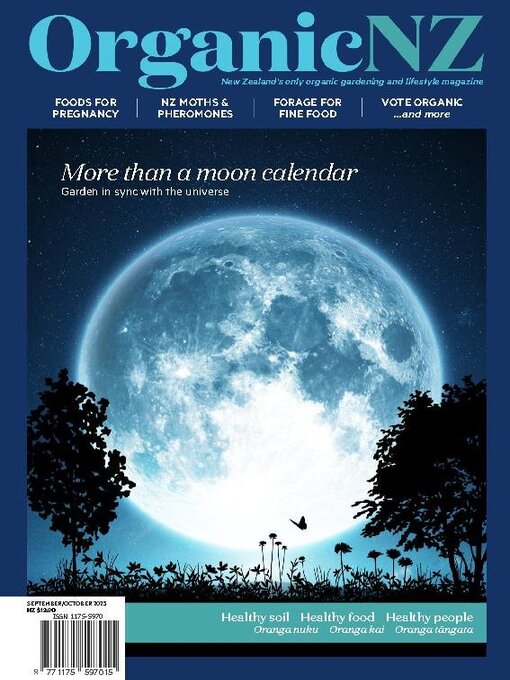
 March/April 2024
March/April 2024
 January - February 2024
January - February 2024
 November - December 2023
November - December 2023
 September - October 2023
September - October 2023
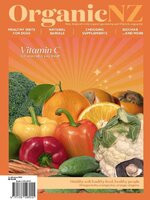 July - August 2023
July - August 2023
 May - June 2023
May - June 2023
 March - April 2023
March - April 2023
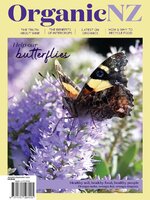 January - February 2023
January - February 2023
 November - December 2022
November - December 2022
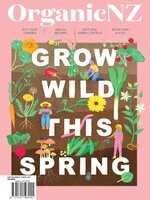 September - October 2022
September - October 2022
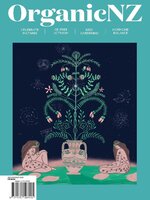 July - August 2022
July - August 2022
 May - June 2022
May - June 2022
 March - April 2022
March - April 2022
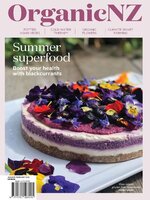 January - February 2022
January - February 2022
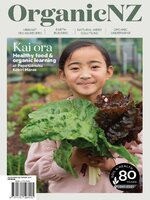 November - December 2021
November - December 2021
 September - October 2021
September - October 2021
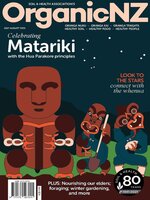 July - August 2021
July - August 2021
 May - June 2021
May - June 2021
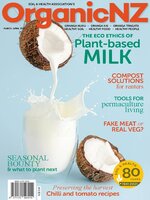 March - April 2021
March - April 2021
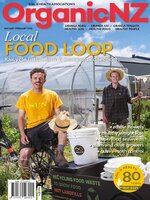 January - February 2021
January - February 2021
